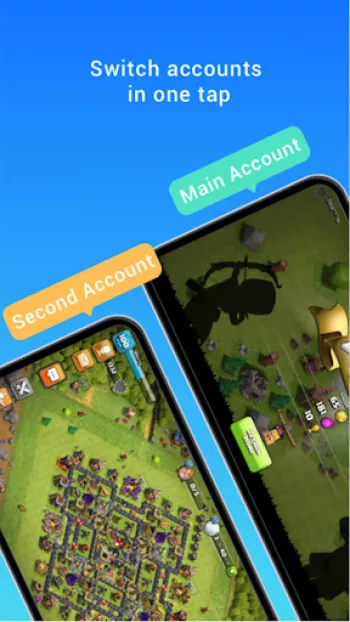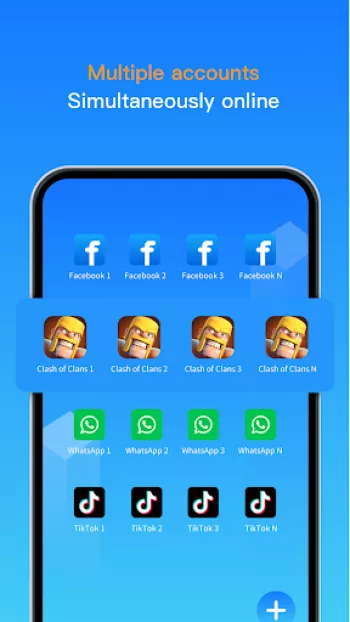Apps Home

Understanding the Need for Android App Cloning
The digital landscape has been rapidly evolving, and with the advent of smartphone technology, Android apps have become an integral part of our daily lives, whether it’s for social communication, online shopping, entertainment, or productivity. As our reliance on these applications grows, so does the necessity for versatility in handling multiple personal and professional accounts seamlessly. Android app cloning emerges as a revolutionary technique that precisely caters to this need. It allows users to replicate apps on their devices, enabling them to run multiple instances of the same application simultaneously. This capability is particularly beneficial for individuals who need to manage more than one account for social media platforms or gaming applications, where originally, the apps do not natively support multiple logins. For example, a user might need to operate two WhatsApp accounts—one for personal and the other for professional communications. Without app cloning, the user would either have to carry two separate devices or constantly log out and back in, which is both inconvenient and time-consuming. Furthermore, Android app cloning finds its significance in privacy management. With the cloning technology, users can effectively isolate their work data from personal activities, ensuring that there is no overlap or unintended sharing of sensitive information. The virtual environment created by applications like Clone App, also referred to as XClone App, provides an innovative solution with features such as hiding cloned apps and protecting personal information like photos and videos. This virtual space not only keeps apps secure but also removes them from the eyes of prying individuals, thereby providing an added layer of privacy. The amalgamation of these features illustrates why effortless Android app cloning has quickly become a necessity in a world that demands multitasking and secure data management.
Exploring the Functional Features of Clone App
Clone App stands out in the realm of application cloning due to its comprehensive range of features designed to enhance user experience and security. Among its core functionalities, Clone App allows users to replicate both social and gaming applications and run them concurrently in a parallel or dual space environment. This virtualization technology supports mainstream social applications like WhatsApp, Facebook, and Instagram, and popular gaming apps such as Free Fire (FF) and Mobile Legends: Bang Bang (MLBB). By creating independent instances, users can have dual accounts for each app, facilitating separate personal and professional usage. This segregation is quintessential for work-life balance and ensures no interference between accounts. A significant feature of Clone App is its capability to offer these services free of charge with VIP upgrades eliminating clone limits, thus allowing extensive usability. Furthermore, the app lock functionality empowers users to shield their applications against unauthorized access, adding an essential layer of security. In addition to cloning apps, Clone App offers a private space feature where users can hide personal media files like photos and videos. These files, once stored in the private space, are not visible in the regular mobile gallery, thereby safeguarding personal content from unintended exposure. Clone App also allows the downloading of resources directly into the private space, ensuring that downloaded content remains discreet. The app's design inherently prioritizes privacy by not storing personal information and requests only those permissions necessary for the cloned app’s operations, maintaining user trust and data integrity.
Technical Insights into Android Virtualization and Cloning
To truly appreciate the technical marvel behind Android app cloning, it's essential to delve into the underlying technology of virtualization that powers Clone App. At its core, virtualization technology in mobile applications like Clone App simulates a parallel space that operates independently from the main operating system environment. This parallel space acts as a secluded layer where duplicated apps are installed and run. The process begins with creating a sandbox environment wherein each cloned app has its resource allocation, which encompasses CPU cycles, memory, and storage. This separation ensures that operations suited to each app clone do not interfere with other instances or the main system applications. Advanced configurations enable the dual space to mimic a separate device, providing a seamless experience as if the app is being run on another mobile gadget. one critical advantage of this technology is minimizing data interference across accounts, as each app clone operates with isolated data paths. The Clone App particularly excels by its user-friendly interface that abstracts the complexity of virtualization, allowing users to set up and manage multiple accounts with ease. The cloning process, although complex in virtual design, is made to be straightforward for users. App interactions, data storage, and even app updates become part of the dual space, thus maintaining the integrity and current functionality of the app clones without disrupting original apps. Furthermore, within the context of gaming applications, efficient resource management is crucial to ensure performance consistency, as games are generally resource-intensive. Clone App navigates this challenge with optimized virtualization techniques, ensuring minimal performance loss even with concurrent game sessions.
Privacy and Security in Multi-Account Management
The increasing dependency on digital applications combined with the sensitive nature of personal and work data necessitates robust security protocols and privacy measures. Clone App tackles these concerns by integrating multiple layers of security and privacy features tailored for its users. The app lock feature is a front-line defense that necessitates password authentication for opening cloned apps or accessing the private gallery, effectively preventing unauthorized access. Privacy space within Clone App further bolsters security by enabling users to hide sensitive applications, meaning even if the device falls into the wrong hands, critical applications remain unseen. Moreover, the general ability to clone apps assists in maintaining privacy by separating personal from professional data. In organizations, where Bring Your Own Device (BYOD) policies are common, app cloning becomes a substantial tool. Employees can work with company apps in a secure clone environment, minimizing the risk of corporate data leaking through personal use. Furthermore, Clone App respects user privacy by ensuring that it doesn’t collect or store any user data, acknowledging the user’s right to privacy. This commitment is pivotal given the rising scrutiny around data protection and user privacy rights. For seamless notifications ensuring the user doesn’t miss any updates from cloned apps, Clone App requires users to adjust device settings to allow background operation and notification permissions. This ensures timely alerts while maintaining security and energy efficiency.
The Future of App Cloning and Multi-Experience Management
As mobile technology continues to advance, the need for flexible application management is poised to grow significantly, making app cloning an essential aspect of future software tools. Innovations in virtualization and cloud technology could soon allow even more complex functionalities, including dynamic resource allocation, enhanced security protocols, and improved UX/UI designs through artificial intelligence. In the domain of app cloning, implementing machine learning could customize user interactions by predicting app usage patterns, effectively prioritizing resources for the most demanded applications. Moreover, the technology could expand beyond just mobile platforms, integrating with desktops and IoT devices, offering a seamless multi-platform experience. Effortless cloning, coupled with robust security, potentially aids in protecting against increasing cybersecurity threats, thereby providing a solid ground for digital privacy rights. In such a scenario, tools like Clone App will play a pivotal role. Their ability to provide parallel experiences on a single device is key, propelling user convenience and multitasking capacity to new heights. Looking into the horizon, provided the technological enhancements, application cloning aligns with futuristic digital ecosystems driven by personalization, security, and multi-user efficiency. As these technologies evolve, Download for Android becomes not just a choice but a framework that aligns personal and professional digital experiences efficiently.
Share Your Opinion
Your Email Will Not Be Published.
All Rights Reserved © Apps Home 2025




















































Afroze Touhid
I've tried several cloning apps, but this one stand out! it's super easy to use and incredibly the app allows to run multiple accounts four my soci...
Zarin Khan
I've tried several cloning apps, but this one stand out! it's super easy to use and incredibly the app allows to run multiple accounts four my soci...
Tony “Big-Tony” Wilford
Great app. i bought Pro. VERY good customer service inside the app as well. i just wish you had a 1 time buy option because i hate having monthly s...
MD Shuvo Bepari
I've tried several cloning apps, but this one stands out! It's super easy to use and incredibly efficient. The app allows me to run multiple accoun...
Ankita Ghosh
I used many of other dual app it's doesn't work for too much time taking lot's off add are waiting for the app open and when the app open is hangin...